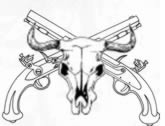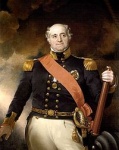The wiki article on this covers much more ground. This is the "interesting" bit.
Initial engagement
The two ships met at half past five in the afternoon, 20 nautical miles east of Boston lighthouse, between Cape Ann and Cape Cod. Shannon was flying a rusty blue ensign and her dilapidated outside appearance after a long period at sea suggested that she would be an easy opponent. Observing the Chesapeake's many flags, a sailor had questioned Broke: "Mayn't we have three ensigns, sir, like she has?" "No," said Broke, "we've always been an unassuming ship."
Shannon refused to fire upon Chesapeake as she bore down, nor would Chesapeake rake Shannon despite having the weather gauge. Lawrence's behavior that day earned him praise from the British officers for gallantry. The two ships opened fire just before 18:00 at a range of about 35 metres, with Shannon scoring the first hit, striking the Chesapeake on one of her gunports with two round shot and a bag of musket balls fired by William Mindham, the gun captain of one of Shannon's starboard 18-pounders. Two or three further broadsides followed that swept the Chesapeake's decks with grape and roundshot from Shannon's 32-pounder carronades. Shannon ran into Chesapeake, with Chesapeake lying athwart Shannon's starboard bow, trapped by one of Shannon's anchors.
Shannon now opened fire on the Chesapeake's maindeck with her after guns firing through the Chesapeake's port holes. Many of Chesapeake's crew were killed or wounded; two thirds of her gun crews were already casualties. The Chesapeake’s wheel was then shot away and her helmsman killed by a 9-pounder gun that Broke had ordered installed on the quarter deck for that very purpose.
With Chesapeake trapped against the Shannon and unable to manoeuvre, Chesapeake's stern now became exposed to raking British fire. Her situation worsened when a small open cask of musket cartridges abaft the mizzen-mast blew up. When the smoke cleared, Captain Broke judged the time was right and gave the order to board. Lawrence too tried to give the order to board, but the British were faster.
Mr Stevens, the boatswain attempted to lash the two ships together to prevent the Chesapeake from disengaging and escaping. This bravery cost him an arm. A party of small-arm men rushed aboard the Chesapeake, led by Broke and including the purser, Mr G. Aldham, and the clerk, Mr John Dunn. Aldham and Dunn were killed as they crossed the gangway, but the rest of the party made it onto the Chesapeake.
"Captain Broke, at the head of not more that [sic?] twenty men, stepped from the rail of the waist-hammock netting to the muzzle of the after-carronade of the Chesapeake, and sprang from thence upon her quarterdeck."
The main-deck was found to be empty, having been swept clear by Shannon’s broadsides. Broke and his men quickly advanced forward along the deck, while more British reinforcements leapt aboard.
Meanwhile, the first lieutenant, Mr George T. L. Watt, had attempted to hoist the British colours over the Chesapeake, but was hit in the forehead by grapeshot as he did so. Fighting had now broken out along the top-masts of the ships as rival sharpshooters fired upon the their opponents in their rival's masts, and on the sailors on the exposed decks. The British marksmen, led by Midshipman William Smith, who had command of the fore-top, stormed the Chesapeake's fore-top over the yard-arm and killed all the Americans there.
Captain Broke himself led a charge against a number of the Americans who had managed to rally on the forecastle. After four minutes of fierce fighting, the Americans called for quarter, but then, finding that they out-numbered the British, they rallied and counter attacked. Three American sailors, probably from the rigging, descended and attacked Captain Broke. Although taken by surprise, he killed the first. Still, the second hit him with a musket, which stunned him, while the third sliced open his skull with his sabre, knocking Broke to the deck. Before the American could finish Broke off, he was cut down by William Windham. Shannon's crew rallied to the defence of their captain and carried the forecastle, killing the remaining Americans.
Broke handed over command of the Shannon to Lieutenant Provo Wallis. Though wounded, Broke was able to save the life of a young American midshipman who had slid down a rope from the fore-top. With American resistance weakening, Lieutenant Charles Leslie Falkiner, who had commanded the boarders who had rushed the main-deck, took command of the prize. While the two yard-arms had been locked together, Mr Cosnaham, who had commanded the main-top, had crawled out on the main yard-arm where he could fire down onto the Chesapeake, killing three of her men.
The British then secured the ship and took her surrender. The engagement had lasted just eleven minutes. Shannon had lost 23 killed, and had 56 wounded. Chesapeake had about 60 killed, including her four lieutenants, the master and many other of her officers, and about as many wounded. Captain Lawrence had been mortally wounded by fire from Shannon’s fore-top and was carried below before the Chesapeake was boarded. His last order upon being wounded was "Don't give up the ship!".






 Reply With Quote
Reply With Quote











Bookmarks